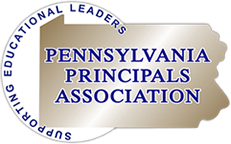Brian L. Cashman, Sr. to Lead Pennsylvania Principals
November 9, 2005
(Harrisburg, PA)—Brian L. Cashman, Sr., principal of Susquehannock High School in the Southern York County School District, is the 2005-06 president of the Pennsylvania Association of Elementary and Secondary School Principals (PA Principals Association). He assumed the position following the PA Principals Association Annual Business Meeting on Tuesday, October 25, 2005, during the PA Principals Association State Conference in King of Prussia.
During his career in education, Mr. Cashman also served as principal at Columbia Senior High School and as an assistant principal at Cedar Cliff High School. He has been an administrator since 1988.
A member of PA Principals Association/NASSP for 16 years, he served most recently as president-elect. He also was the Central II regional representative to both the PA Principals Association board of directors and the former Pennsylvania Association of Secondary School Principals (PASSP) board. In addition, he served as the advisor to PA Principals Association’s Secondary Awards Committee, as the PA Principals Association State Conference co-chairperson in 1999, as a member of the NASSP Student Activities Contest Committee and PIAA District III Committee.
He earned a bachelor of science degree in health and physical education from Slippery Rock University and a master of science degree in school administration from Western Maryland University. Mr. Cashman has completed course work towards a D.Ed. from NOVA Southeastern University.
Mr. Cashman resides in Hanover, Pa., with his wife, Judy, a teacher at Smith Middle School in York City School District. They have three children, Chris, 32; Brian, Jr., 30; and Jennie, 27.
PA Principals Association’s mission is to: Assist members in fulfilling their role as instructional leaders and effective managers who promote the best educational program for all students; give members an effective voice in the educational decision-making process at the local, state and national levels; and improve members’ working conditions so that their rights are protected, their job descriptions are reasonable, the importance of their instructional leadership role is recognized and their salaries and fringe benefits are equitable.
